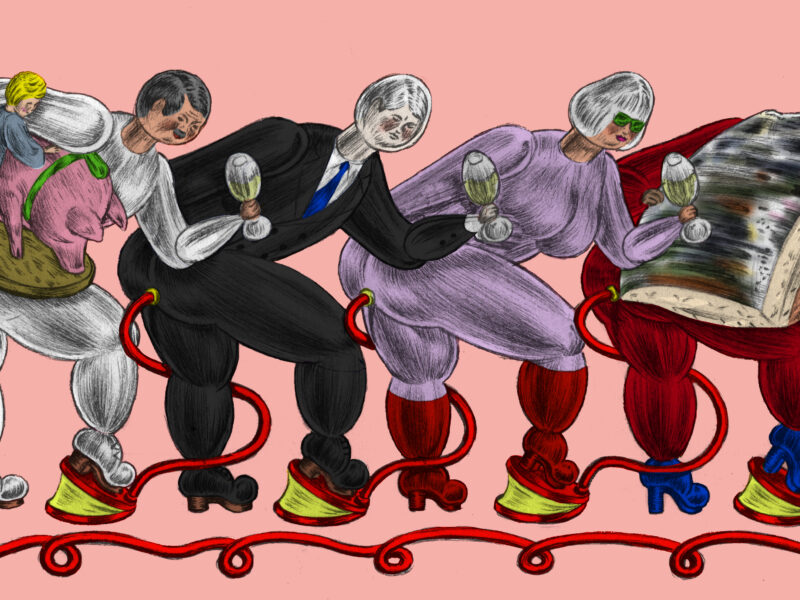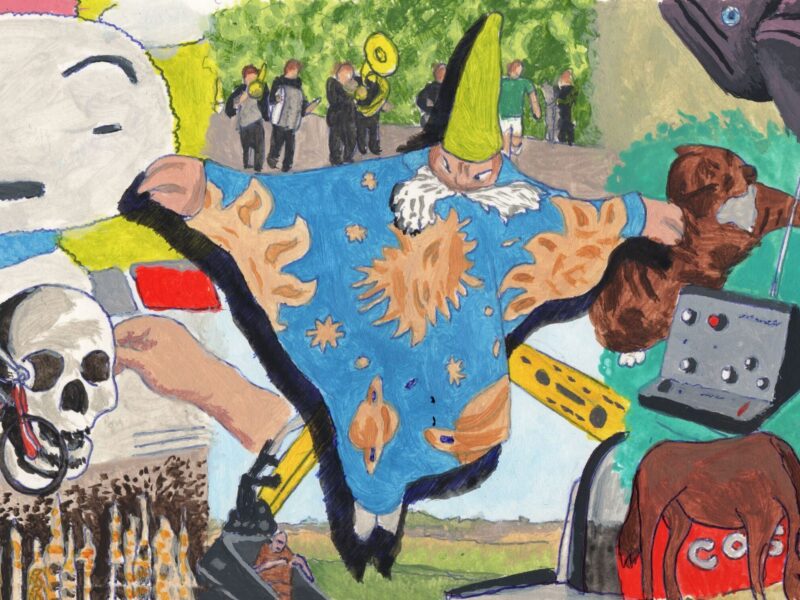As immigrants, my friends and I depend on each other in ways I’ve never needed back home.
“Old Friends” is an ongoing series exploring the many ways that friendship changes shape in adulthood.
For months, I thought coming to New York City was a mistake. I’d accepted an unpaid internship in the city, leaving my home in Bogota to try living abroad. I dreamed of going to Broadway shows, dining out at different restaurants—enjoying all the fun New York had to offer. But instead, in addition to my internship, I ended up taking another job, just to afford rent. I worked sixteen hours a day, six days a week, with little time to socialize. I was burned out and deeply lonely. Then, one day, my friend Carolina suggested we go out after our internship and do something fun.
“We should go rollerskating at Rockefeller Center,” she said.
I used to skate for fun back in Colombia—my home country—when I was a teenager, but hadn’t gone in years. Still, I thought it was a great idea. Carolina was a talented skater, and we had so much fun looping around the rink that I was reminded of the joy skating had once made me feel.
For the first time in months, I was completely at ease. Then, as we were leaving the rink, I fell. When I looked down, my arm was shaped like the letter “s”: I’d broken my left wrist. Carolina, somehow, found the strength to pull me up, call an Uber, and take me to the nearest hospital. She waited with me for hours in the emergency room, where I learned I’d need nails and a cast to fix my broken bones.
As my arm healed, Carolina took the subway with me to work every day, protecting me from accidental bumps. She brushed my messy hair, pulled down my pants so I could pee, and dressed me up again; all things I’m not sure I’d ask even my closest friends to do for me back home.
At the time, we had only known each other for four months.
~
I once read an Instagram post that said being an immigrant is like becoming a dog: one year as an immigrant equals seven years of life experience. Friendships, then, become intense and profound more quickly than they might back home. Sometimes, out of necessity, they become deeper than our friendships back home, too.
Adult immigrants often find themselves profoundly alone. Our families and closest friends usually remain in our home countries, hundreds or even thousands of miles away. The friendships we form in our new lives, then, become everything to us: our support network, our first call, our emergency contacts.
In an unfamiliar city, we also seek familiarity. As immigrants, we tend to connect more deeply with people from similar cultural backgrounds, something especially meaningful when we suddenly become the “other” after a lifetime of living in a country where we are the “norm.” Sharing a language, traditions, and social cues lowers the barriers to intimacy: When someone understands the way you were raised, you don’t have to justify or over-explain everything you do.
Carolina was from Bogota, too, and had started at the same internship a week before I had. We had a lot in common: We both came from Catholic-conservative backgrounds, needed to be very mature at a young age, identified as feminists, had issues making friends, and wanted to start life from scratch in the city. We shared similar experiences growing up, and similar experiences since coming to New York. But our friendship deepened after I broke my wrist: I knew then that we could rely on one another. That if something ever happened to me again, she would take care of me—and if something ever happened to her, I’d take care of her, too.
Carolina isn’t the only immigrant friend I’ve felt this immediate intimacy with. One day, I was hiking with Nicol, a Peruvian friend. The trail was rocky and we had to march in rhythm just to move forward. Suddenly, a memory popped into my head: In primary school, I used to march like a soldier with the rest of my classmates. Military culture is deeply ingrained in Colombia because of our near century-long history of war and internal armed conflict. It felt silly, but I decided to share my memory with Nicol.
“Oh, yeah, we did that at my school, too,” she said. “It was so ridiculous. Our parents would come watch us march in squared formations.”
Of course. Peru, too, has a history of armed conflict, and military culture was a part of her primary school indoctrination as well. She didn’t make fun of me for what I thought might be a strange confession. Instead, she took my memory and treated it with care—turning it into something funny and shared.
I immediately felt closer to her, something unusual for me. I’ve always considered myself introverted. During my undergrad years in Colombia, I experienced severe social anxiety. I was trapped in an internal monologue that told me I was boring, strange, and hard to love. For nearly two years, I didn’t make a single friend. I built high walls around myself that kept everyone out. After a while, I made meaningful connections that have stayed with me, but I’d never found it easy.
When I migrated, I assumed I’d again struggle to make friends—especially since, on top of everything else, I now had to add “not fluent enough in English” to my long list of self-demeaning adjectives.
But when I started grad school in the States, I made friends within the first two weeks. At the time, I thought maybe I had changed somehow; become more at ease within myself, more confident. But looking back, I can see it was something else: My deep, human need to belong—and the comfort I felt around other Latin American students—had activated parts of me that had been frozen.
A couple of weeks ago, I spent the afternoon with María, a friend from Mexico. Before coming here, I had never had friends like her—extroverted, party lovers, heavy users of dating apps, full of energy. After a long conversation about how Latina diet culture has shaped our relationship to food and our bodies, I realized our friendship had grown strong, in spite of our differences, because it was rooted in something larger than us. Like with Carolina, and Nicol, and countless other immigrant friends, we were united by our need to resist a homogenizing environment. We were united by our shared confusion about U.S. social cues. We were united by our warmth, our humor, and our overlapping memories, even if we didn’t grow up in the same country.
“I’ve noticed you’re literally like my younger sister,” she told me. “The good girl who wants to fit in and carries the weight of your lineage. We’re very different, but there’s a strong emotional connection between us.” I realized then that she is, indeed, a lot like my older sister, too.
I’ve been in the U.S. for almost two years now, and I still find it hard to make American friends. Sometimes, people make xenophobic comments to me in the streets. When I meet people who grew up in the States, I quickly find myself running out of conversation topics, unable to find much common ground—something that still makes me feel out of place. But my immigrant friends are part of the reason I still want to stay, to put down roots.
At the end of the day, home is where you feel safe, loved, and cared for, rather than where you grew up. If I have friends who look after me, who resist the harshest expressions of discrimination and exclusion by my side—then here, I’ve found a place to call home.
Don’t get me wrong: I have beautiful, loyal friendships in Colombia, too. But my friends there don’t need me to survive. In Colombia, if I got sick, I could call my parents or sisters, and they would drop everything for me. But there, I had never been anyone’s emergency contact. My friends back home already had someone else to call—their own parents, siblings, partners.
In contrast, my friendships in New York became lifelong within months. I’m now the emergency contact for two friends. I’ve been the caregiver for one of them coming out of a medical procedure that needed anesthesia. Here, my friends and I depend on each other to be each other’s version of family, to be a shoulder to cry on, to be someone reliable for medicine delivery; as a party plus-one, a caregiver, a babysitter (or cat sitter!), among many other things.
The need to survive, to resist, to belong, and to be comforted—that’s what first pushed us together. But it’s the care, love, and familiarity that’s kept us bonded.



